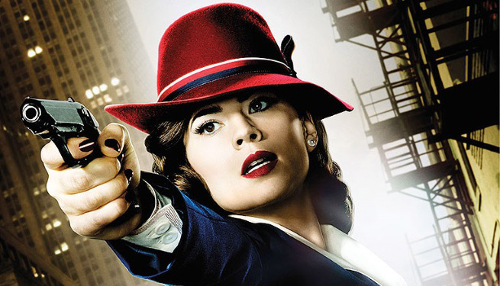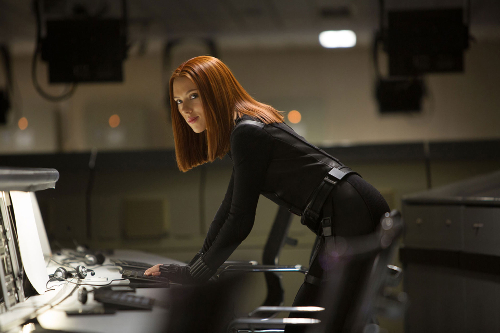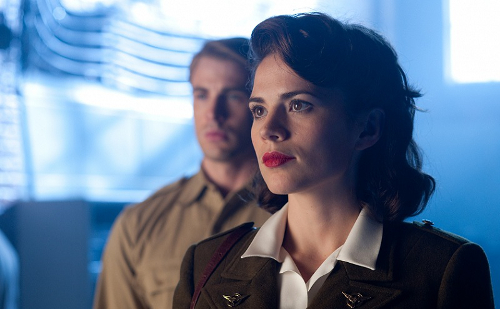
Let me be perfectly clear: I loved the premiere of Marvel’s Agent Carter. I was already a huge fan of the character from the Captain America movies and her Marvel One-Shot short film, and these first two episodes of her new TV series lived up to my high expectations.
The best word I can think of to describe the show is satisfying. Watching it feels like slipping into a warm bubble bath or necking an ice-cold beer. Or doing both at the same time. And you have a pizza.

It’s New York, 1946, and Hayley Atwell’s Peggy Carter is an agent with the Strategic Scientific Reserve. Despite her clout during the war, she’s now the sole female agent in her office and is treated as a secretary. Enter Howard Stark with a secret mission for her to clear his name while saving the world from his stolen weaponry, and Agent Carter has a lot of spying and fighting to do on top of her usual daily sassing of her sexist co-workers. She puts chauvinist jerks in their place, she kicks guys in the face, and she looks great (and I mean great) doing it: “weaponized femininity” is laid on so thick here she actually knocks a guy out with her “Sweet Dreams” spy lipstick.

But it’s not just seeing a badass chick beat the wide ties off of sexist dudes with a stapler that makes Agent Carter so gratifying (although that’s a big part of it). I’ve been lucky enough to live my adult life in a post-Xena and Buffy world where I can count on a fairly steady stream of ladies who can kick butt in my media.
But I think the heart of what makes Agent Carter feel like a feminist triumph is that we are watching a would-be love interest as the hero of her own story. As tumblr user mcpricekissed put it:
it would be so cool to have a superhero movie or a show where the story starts with a hero kicking ass but then he dies and his so called love interest takes over and finishes off his job oh wait that’s literally happening with agent carter
Peggy mourns Steve Rogers the way male action heroes morn their tragically dead wives/girlfriends/daughters. Captain America himself is this woman’s tragic backstory. Re-positioning Peggy as the central character this way is not only satisfying from a feminist perspective, it also helps overcome the also-ran status of a TV tie-in to a billion dollar film franchise.

Unfortunately, the show still felt the need to kill off a supporting female character in the pilot to add to Peggy’s guilt pile, either because we know Cap isn’t really dead, or because there is some obscure Writers Guild bylaw where the blood of a female character must be spilt in the first episode of any action series to appease the cruel and vicious gods of television.
And here’s where I get to the rub with Agent Carter. While the first word I use to describe it is satisfying, the second is indulgent. This is feel-good feminism knocking down cartoonishly chauvinist straw men from the Bad Old Days, so we can pat ourselves on the back for how far we’ve come, and not worry about the complicated problems of the present. But just because something feminist is set in the 1940s doesn’t mean it has to embody old-fashioned feminism, with its total disregard for all the other systems of oppression that intersect with the patriarchy.

But just as several clever feminist commentators worried it would be, Agent Carter‘s feminism is fairly one-dimensional. There are little glimmers of commentary on class and disability, but both as they specifically relate to the post-war era. Where the show really fails is race, with its all-white cast and absurd under/mis-use of its only person of color with a speaking role in these two episodes, Andre Royo’s Harlem night club owner who is a) in cahoots with the bad guys and b) ends up dead.
To quote another tumblr user, duvallon:
love it when a show set in the late ’40s/early ’50s RELENTLESSLY addresses misogyny against white women but ignores race while using people of color as expendable villains
it’s just great
There are six more episodes of Agent Carter, and hopefully we’ll see improved representation and more thoughtful, truer feminism as the season progresses. If not, then I, as a white feminist who tries not to be a White Feminist, will face the arduous task of forcing myself to not unconditionally love Agent Carter.
Robin Hitchcock is an American writer living in Cape Town who is now shopping for a red hat.












